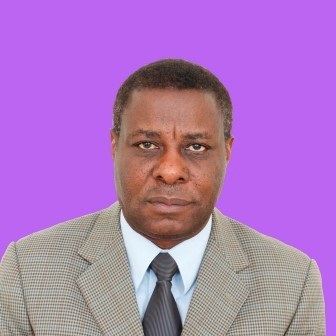
Head of Department
The department is growing with the introduction of and increasing numbers of graduate programmes and PhD research supervision. This means there are more courses to teach at both undergraduate and graduate levels, in addition to supervision of PhD research candidates. The Department is proposing a review of the establishment for academic to effectively provide service to both undergraduate and postgraduate programmes. Currently, the department has Seven (7) postgraduate programmes running (i.e. 42 courses being offered by the department). These 7 programmes were created in 2013/2014 academic year and 1 in 2014/2015 academic year respectively. This academic year (2016/2017), the department has developed 2 more programmes. In total, the department will have 9 postgraduate programmes
Background
Students in Electrical and Electronic Engineering can opt to major either in Electrical Machines and Power Engineering (EMP) or Electronic and Telecommunications Engineering (ET). The Department covers the following: Electronic Engineering; Telecommunications; Electrical Machines; Electrical Power Systems and Control Engineering.
A post-graduate Programme exists in the Department for the MEng degree in Electrical Power Systems. Additionaly, a postgraduate Diploma in ICT Policy and Regulation is also offered in partnership with other African Universities.
Students can also enroll for research programmes in the Department leading to a higher degree.
Electrical and Electronic Engineer Graduates
Electrical engineering touches almost every facet of our existence. It is one of the fastest changing fields of technology and offers professional challenges and satisfaction to both men and women. Electrical and electronic engineering involves the generation, distribution, supply and exploitation of electrical energy. It deals with control of resources, transport, entertainment and telecommunication.
Power engineers work in organisations that generate and supply electricity to domestic and commercial users. They work on power conversion equipment or transportation, pumping, mineral processing and manufacturing equipment that uses high-voltage electrical power. They are also employed in design and manufacturing industries dealing in all kinds of electrical machines, implements and appliances.
In the electronic engineering discipline, engineers are involved in telecommunications and electronic equipment such as televisions, radios, computers, information transmission and processing. They deal with instrumentation and control of process
Mission
Establish CORE Business:
- With triangular partnership
- Ensure sustainable Academia-Industry linkages
- Diverse disciplines of relevance
- Geographically dispersed (we are in Macha already!!!)
- Target: Intensely linked relationships between the receiver (them) and the deliverer (you)
 Make Available Quality Manpower:
Make Available Quality Manpower:
- In areas of societal & industrial relevance
- Adequately meeting demands
- State-of-the-art facilities for education, research & consultancy
- Degree, certificate & Training programme relevant to industry
- Substantial and sustained funding from Government, Industry/User organizations(e.g.Zesco,Zamtel,LaFarge,CEC,Celtel,Zamefa,etc) and other educational Institutions.
- Dedicated specialists & skilled manpower
- Capacity to turn over about 500 world-class UGs annually for industry and economy
- One stop shop for innovation needed by industries in any discipline and located anywhere to stay globally competitive
- Partnering would make industry access the entire physical and intellectual assets most economically
Core Experties
The University of Zambia through the Department of Electrical and Electronic Engineering in the School of Engineering can offer to all sectors of the industry. The expertise is offered in: Electrical Power Systems Analysis and Design,Stability Studies,Faults Analysis Energy Efficiency and Renewable Energy Technologies Energy Policy and Regulatory Framework ICT, Policy and Regulatory Framework Electrical Energy and Energy Conversion : Electrical Machines Energy Audit Project planning and Management Electronics Repair : Electronics & Telecommunication Laboratory Equipment, Designing and Building Electonic Circuits, Precision Calibration Process Control Instrumentation, Winder Control, PLC Maintenance, Computer Hardware Maintenance Electrical Machines and Power, Instrumentation and Control.
| Consultancy Performed | Client |
| Short course: troubleshooting and repair of switched mode power supplies | Zambian industries |
| Power conditioning, protection and protection of electrical and electronic equipment and installations | Zambian industries |
| Repair and maintenance of microcomputer based equipment and plcs. | Zambian industries |
| Repair and maintenance of equipment built with surface mounted devices (SMD). | Zambian industries |
| Repair and maintenance of UPSes | Zambian industries |
| Other consultancies: power audit of ECZ IT networks | ECZ |
Testing And Research Facilities
The Department has a variety of research and teaching facilities and has created strong links with Industry.The acquiring of modern computers and other equipment for academic staff and researcrh fellows has also greatly improved the ICT infrastructure in the department.
The Department’s laboratories and workshops are well equipped to allow teachning and research in the following areas
- Electric circuits, Electromagnetic fields, Computer Engineering, Telecommunications, Digital Electronics, Systems and Control
- Electrical Instrumentation, Soil Resistivity and Earth Resistance Measurements, Oil Measurements, Leakage Current Measurements, Motor Testing and Maintenance, Computer Diagnostics , Maintenance, and Software installations.
Undergraduate Programmes in the Department
Postgraduate Programmes in the Department
- Master of Engineering (Computer Communications) (Taught)
- Master of Engineering (Electrical Power Engineering) (Taught)
- Master of Engineering (Electromagnetic Compatibility and Electrical Safety) (Taught)
- Master of Engineering (High Voltage Engineering and Power Management)
- Master of Engineering (ICT) (Taught)
- Master of Engineering (ICT) Security (Taught)
- Master of Engineering (ICT Regulation, Policy & Management) (Taught)
- Master of Engineering (Telecommunications Systems) (Taught)
- Master of Engineering (Wireless Communications) (Taught)
Short Courses
- Substation Automation using IEDs(Intelligent Electronic Devices) Effects of Trading Under High Voltage Transmission Lines
- Efficient Energy Utilisation to Minimize on Maximum Demand(MD) –The Konkola Copper Mine Case
- Renewable Energy Solutions for Rolling out of Telecommunication Services in Rural Zambia not Connected to The National Electricity Grid
- Intelligent Traffic Lights Controller Using PLCs
- Multilayer Printed Circuit Board (PCB) Design
- Antenna Azimuth Position Control System Design
- Can PSTN Survive the Mobile Communication – Zambian Case
- Renewable Energy Solutions for North western Province
- Micro-hydro Power Generation System
- Stability Studies for the Up-Rated units in the Zesco Power stations

